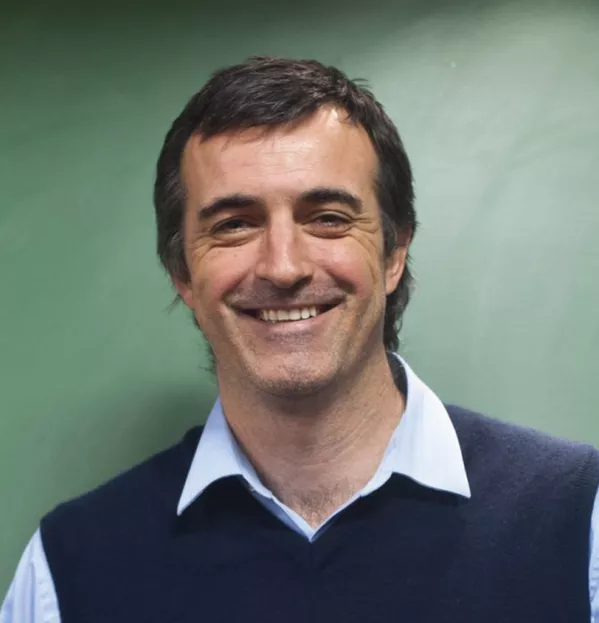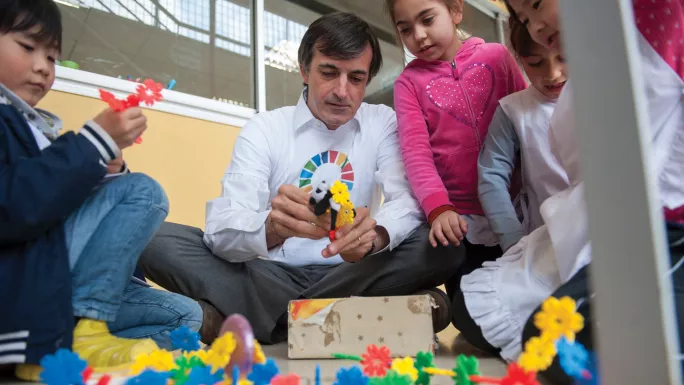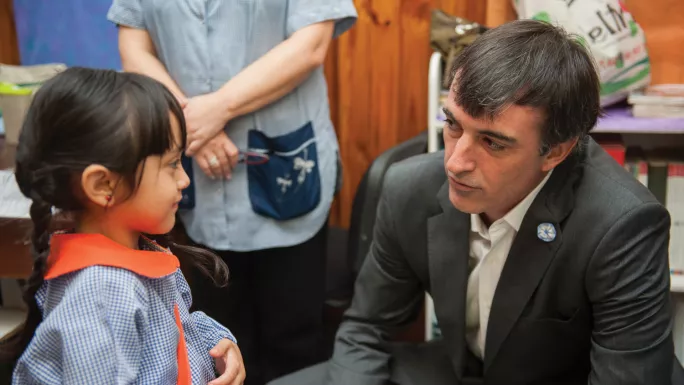‘Teachers are so important - we need to protect them’

“A mother went into a fifth-grade classroom, grabbed the teacher by the hair and started knocking her head into the desk in front of the kids.”
Esteban Bullrich is describing the incident that sparked his latest attempt to improve the lives of teachers.
As an education minister - first for Buenos Aires and now for the whole of Argentina - the self-styled “crazy German-Basque”, has made a name for himself through his innovative ways of engaging with the profession.
Keen to be seen as ultra-accessible, he famously gave out his personal mobile phone number to teachers and asked them to call him with any concerns, which they duly did - sometimes in the middle of the night.
Now, following a series of brutal assaults on teachers, he is trying to introduce a law under which parents or students convicted of physical attacks will receive a penalty increased by 25 per cent - either a longer prison sentence or a bigger fine - if their victim is a teacher.

But why should teachers, in particular - and not nurses and other frontline workers - enjoy such special status in law?
Because education is the most important public service of all, with the power to dampen community tension and even prevent terrorism, Bullrich replies.
“Without teachers, I wouldn’t be a politician, you wouldn’t be a journalist,” he says.
Bullrich admits to feeling tired at our meeting in a central London hotel on a chilly December evening, having arrived on an overnight flight earlier that day from Argentina. It is no surprise that he hasn’t slept well; the 6ft 6in minister insists on flying economy, despite the inevitable selfie requests and public admonishments from other passengers.
However, his star is rising. Not just politically - he won a place in federal government a year ago - but also educationally. Buenos Aires was entered into the Programme for International Student Assessment (Pisa) as its own entity, owing to problems with Argentina’s data, and saw the largest jump in scores of any area.
Boosting teachers’ pay
And given that teachers in the city have been granted a 30 per cent pay rise, their counterparts over here, facing just 1 per cent, could be forgiven for casting envious glances in Bullrich’s direction.
Except that it is not quite so simple. Inflation in Argentina at the time was not far below 30 per cent. And Buenos Aires’ teachers staged a mass walkout in August over pay after Bullrich had refused unions’ demands for a 42 per cent pay increase to match new inflation levels.
By then he was in his current federal job - where he is now warning that working in classrooms can “contaminate” headteachers’ thinking.
Without teachers, I wouldn’t be a politician
Bullrich has set his sights on boosting the quality of leadership in Argentina’s schools. From next year, a deal signed by each of the 24 provinces will result in teaching graduates deciding in their final year of training whether they want to teach or lead - opting for one of two distinct career paths.
After all, Bullrich says, “only 0.1 per cent of the population are natural born leaders…We have to train you to become one”.
If the politician has his way, most schools in his country will be led by ambitious twenty- and thirtysomethings who have never held down a full-time teaching role. “For leaders, classroom practice is overrated,” he says. “Sometimes, it can contaminate your thinking.”

But persuading the brightest pupils to go into teaching is also high on his agenda. A national scholarship scheme, launching next year, will award the highest-performing secondary school students with a bursary worth half of the initial teacher salary, if they decide to study teaching.
He worked hard to gain the trust of the profession after taking office in Buenos Aires in 2010, amid serious industrial unrest that had brought 30 days of strikes over two years. Quelling the tensions involved long negotiations with no fewer than 17 separate teaching unions.
At the same time, a shockwave hit his family. “Five days after I took office, my daughter was detected with cancer,” says the father-of-five, whose children now range in age from 2 to 14. His daughter is “doing well now”, but her illness, understandably, affected his outlook on life.
“I think it really made me very humble in terms of understanding you have no control over anything - so don’t try to control things,” he says. His faith also contributes to this philosophy; he is due to meet the Pope the day after our meeting.
Equality in education
Having realised that attempting to rule with a rod of iron would get him nowhere, he focused on listening to teachers’ concerns; in his four years in charge in Buenos Aires he closed six consecutive salary negotiations, and there was only one strike while he worked for the city.
But Bullrich did attract criticism after introducing an online registration system for schools that was blamed for thousands of children in the Argentinian capital being left without a school place.
He is most proud of the fact that the achievement gap between private and state schools was halved during his time in the city.
Bullrich’s views on selective education are unequivocal: “I think it’s a huge mistake for education leaders to talk about selective systems,” he says, when conversation turns to the UK government’s plans to expand grammar schools in England.
‘It’s a huge mistake to talk about selective education’
“Education is not only knowledge, it’s also values and culture. If you want to have a more united society, less violent, more tolerant…I think [selection] would be the worst thing you could do.”
Buenos Aires was ranked 38th in the Pisa tables, but if Bullrich’s plans have the intended effect, by 2030 Argentina will be among the top five education systems in the world. Such a long-term goal is rare in politics, but this is not your average politician.
You need a Tes subscription to read this article
Subscribe now to read this article and get other subscriber-only content:
- Unlimited access to all Tes magazine content
- Exclusive subscriber-only stories
- Award-winning email newsletters
Already a subscriber? Log in
You need a subscription to read this article
Subscribe now to read this article and get other subscriber-only content, including:
- Unlimited access to all Tes magazine content
- Exclusive subscriber-only stories
- Award-winning email newsletters